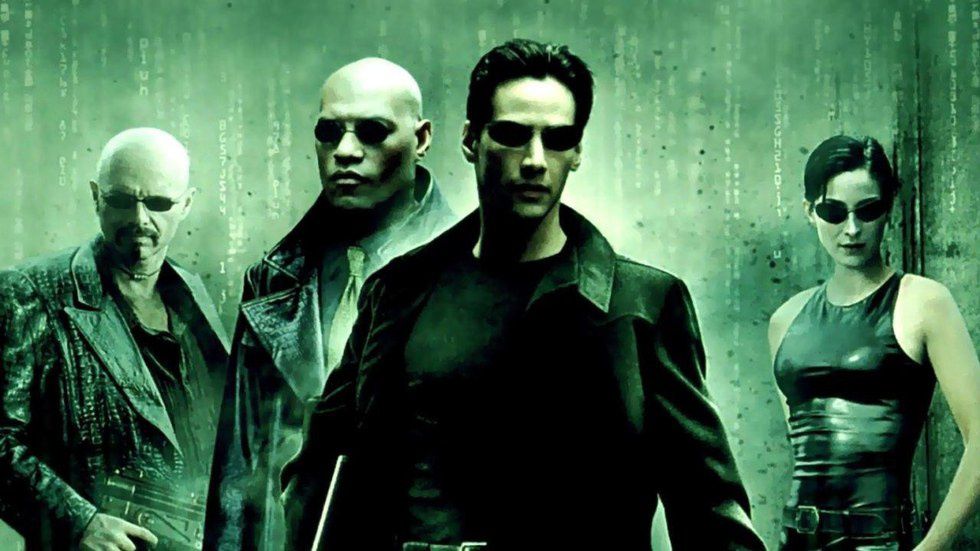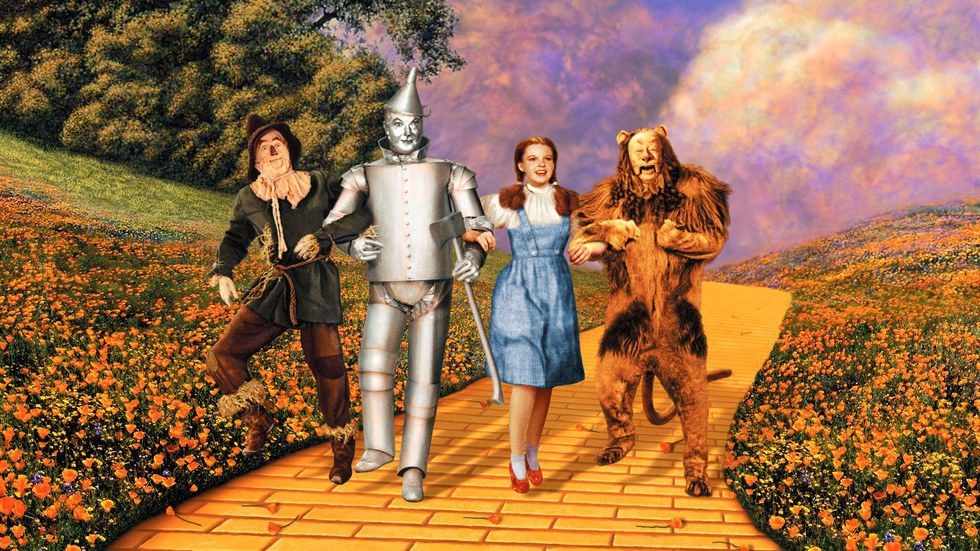In this article, I will compare and contrast a few different sources that are of the same idea as Plato’s Allegory of the Cave. I will explain how there are many contemporary versions that have the same basic point of man getting ahold, or a small taste of something that they do not fully understand, and how having that feel for “the good” cannot work, as it is an idea beyond human perception. I will do this by referring to The Republic by Plato in which the Allegory of the cave is conceived, and then I will move to contemporary works/films and their written transcripts: The Matrix, and The Wizard of Oz.
In Oz, it is only through having the 'curtain' pulled back that we see things for what they 'really' are, and, in The Matrix, it is only through being 'unplugged' that one can 'realize' what exists. Along with this, I will include detailed notes. I will discuss how in the films and in the story, there are very similar aspects as well as there being many things that contrast. I conclude with the way in which these works apply to human life today, through the contemporary works, as well as anecdotal examples, and from there it will be clear that man is not made to understand “The Good” or, more specifically, that which goes beyond human conception.
As I have previously stated, it is easiest to "see" it in modern day metaphors through various films. The two that jumped to my mind when researching this were The Wizard of Oz and The Matrix. First, when talking about Oz, we must look at the plot in terms of its likeness to the Allegory of the Cave. To fully do this, we must explain just what this allegory is.
Plato attempts to explain the nature of reality. The cave represents the state of the majority of human beings, and is the tale of a dramatic exit from the cave as the source of true understanding or human perception. Plato claimed that knowledge gained through the senses is no more than opinion and that, in order to have real knowledge, we must gain it through philosophical reasoning. In the Allegory of the Cave (pictured above), Plato distinguishes between people who mistake sensory knowledge for the truth (The prisoners) and people who really do see the truth (Those that have been freed/escaped). In the cave, there are prisoners. The prisoners are tied to some rocks, their arms and legs are bound and their head is tied so that they cannot look at anything but the wall in front of them. Behind the prisoners is a fire, and between them is a walkway. People outside the cave walk along this walkway carrying things on their head including but not limited to; animals, plants, wood and rocks. These people create shadows. If a prisoner has never seen the real objects before, they would believe that the shadows of objects were ‘real.’
Plato suggests that the prisoners would begin a ‘game’ of guessing which shadow would appear next. The prisoner that guesses correctly is seen to the others as being wise, although it will be shown that this is a fallacy. Next to move the plot along is the escape. As stated, one of the prisoners escapes from their bindings and leaves the cave. He is shocked at the world he discovers outside the cave and does not believe it can be real. He is blind by the sun and must adjust to this new phenomena. As he becomes used to his new surroundings, he realizes that his former view of reality was wrong. He begins to understand his new world, and sees that the Sun is the source of the good and goes on an intellectual journey where he discovers beauty and meaning (The Good). Now, this is the point in the fable in which the return happens. As a human, we are social creatures and due to this, the prisoner would want to return and share what he has learned with their former peers.
However, upon returning and sharing this new knowledge, the other prisoners see him as arrogant and do not believe him and they threaten to kill him if he tries to set them free. It is assumed that the prisoner would in fact be killed as the life in the cave would not be of any use or pleasure to him as he knows the truth, but cannot share it. (Plato. The Republic Book 7). To put this idea in a common day phenomenon, we simply must think of a time when we thought things were one way but became enlightened as to 'realize' the 'truth.' Santa Claus is a good case; he is a shadow on the cave; however, do you still exist within that cave? Do you still believe that a large gentleman from the North Pole brings you gifts? Of course you don’t. Although, as a child, this is truly what you believed until you were shown the truth, and to that point, you stopped thinking Santa was real, and could not necessarily go back to thinking that he existed after knowing the truth. This anecdote, as this was the case with me, shows this idea of the cave well.
To start with our contemporary examples, I would first like to begin with The Matrix, a 1999 film by the Wachowski brothers, that mirrors Plato’s allegory almost exactly in structure, but, it should be noted that its storyline is more complex. The film draws in a modern audience, who can relate to its protagonist, Neo, because we too may have felt disconnected from present society. Just as the prisoners in the cave, Neo is chained to massive wall where machines harvest his body’s heat to power themselves. Neither the prisoners nor the people in the matrix realize that they are prisoners; they are completely unaware the reality they think they know is false.
While explaining the matrix, Morpheus says to Neo, “…you are a slave, Neo. Like everyone else you were born into bondage. Born into a prison that you cannot smell or taste or touch. A prison for your mind.” The Matrix adapts the dark cave, where prisoners are literally chained, to become one of a virtual state, where people are not physically bound, but mentally, furthering their belief that they are free though they are not. This prevents them from doing anything about their imprisonment (The Matrix. 1999). This is a way in which The Matrix is similar or shows a likeness to Plato’s cave. It is when they are ‘plugged in’ that they are prisoners and it is when they are ‘unplugged’ that they are shown the truth, or the good.
Although, as will be explained in a moment, for some, this good that is beyond human conception may be too much to handle and cause some to return to their imprisoned state. It is upon human limitations that we are bound. The Matrix manifests these human limitations not only in the characters’ pursuance of knowledge, but also of their ability to break physical limitations that the captive humans are still subjected to. Just as Neo is able to perform physically impossible feats once he learns to manipulate the matrix, the philosopher is able to learn infinite wisdom once he breaks free from the cave. Neo knows his physical limitations in an act of Socratic wisdom and tries to break those limitations. Neo knows his limits and knowing that they are not real, allows him to accomplish anything in the matrix, such as stopping bullets in mid-air and flying. (Wachowski. 1999.).
One key dilemma The Matrix elaborates on is whether or not the prisoners want to break free from their perceived reality. In The Cave, Plato casts the cave in a very negative light: the prisoners are chained, the images are dark and distorted. While in The Matrix, the virtual reality is a pleasant one, though its inhabitants are mindless, they also have very minor worries and life is not harsh or scary. A major plot twist in the story is when Cypher betrays the group because he prefers the easier way of living provided by the matrix and would rather return than fight the machines (Wachowski. 1999.). While it’s hard to believe anyone would want to stay chained to the wall of a cave, it is not that hard to imagine staying in a virtual world like the one the matrix inhabitants resided in as opposed to entering a dark, post-apocalyptic war zone. This is the major point in which the two stories diverge, or contrast. The Matrix, like Plato’s The Cave, engages the reader in a fictional world that also connects with our own world, causing us to critically analyze our perceptions of reality. The Matrix modernizes the original allegory and adds human dilemma, emotions and intense fight scenes to connect the ancient philosophy to a contemporary worldview.
The Matrix, however, is not the only contemporary story in which the same scenario is given. The next contemporary film to be analyzed will be The Wizard of Oz. What does little Toto have in common with the prisoner from “The Allegory of the Cave?” Everything. Toto’s reveal of the wizard’s true identity when the curtain is pulled back and the resulting aftermath is comparable to the prisoner’s revelation of reality. In a few specific ways, The Wizard of Oz serves as a parallel to “The Allegory of the Cave”: The wizard acts as the puppeteer creating an alternate reality, Toto gets to the true reality, and Dorothy, the Scarecrow, the Cowardly Lion, and the Tin Man choose to accept this true reality. (The Wizard of Oz. 1939.).
Upon entering the wizard’s vast world, the Core Four (Dorothy, Scarecrow, Cowardly Lion, and Tin Man) feel trapped to the wizard’s illusion of reality. Like the prisoners chained in the cave, the four are limited and can only see the blinders that cover the group’s eyes that make them oblivious to the fluttering curtain on the left; just as the chained prisoners cannot see the wall which hides the puppeteers. The core four would have continued to operate under their illusion of their reality if it were not for the insight of Toto. Unlike Plato’s unwilling prisoner, Toto chose to reveal the true reality. This is a point where the stories diverge.
This separation from Plato’s prediction could be explained if Toto never fully accepted the false reality the wizard tried desperately to make real. Indeed, this explanation would explain the core four’s response to the stunning truth. It is worth noting that the perplexity and pains were endured by the wizard, the creator of the false reality, just as Plato suggested would happen to one that discovers The Good (Plato. The Republic Book 7.). After the reveal of reality, only the wizard seemed to have issue with the change. This flips Plato’s “Allegory of the Cave” as it would be the “puppeteer” who could not face the truth, not the “prisoners”. In fact, instead of confusion, Dorothy simply, strongly condemns the wizard, “Shame on you” (Langley et al. 1939.).
In keeping this view, if this film were the Allegory of the Cave, Instead of a prisoner who is mocked by his new knowledge of truth, the prisoners would together rise up against the oppressive puppeteers. Unfortunately, this was not the case, as the two stories are not one in the same. These are simply contemporary thoughts. Finally, the reveal of the wizard in The Wizard of Oz serves as a modern-day Allegory of the Cave; that is, with a new take on the story. The Wizard of Oz allows viewers to feel acceptance with facing and discovering truth, not fear or perplexity. That is the main difference.
All things considered, I believe that this classic story has been very influential in stories of today and yesterday. There can be found similarities with more stories than just the two I have analyzed, and that goes to show that this idea is still prevalent in modern society. Reality is a weird concept that is complex and literally cannot be explained easily, only attempted to be understood. That is what this article was about, attempting to find a source of our reality. It is, as stated at the start, a taste of the good, or what is beyond human conception.
After reading this, you might continue to think about it, or gain knowledge on the subject through research. Or, you might go on your phone, and remain in a perpetual state of the reality in which you belong. Either way, no one will blame you. It’s just human nature to feel comfortable/secure. This again, is why the prisoner and Cypher wanted to return to their previous realities after being exposed to something different.























